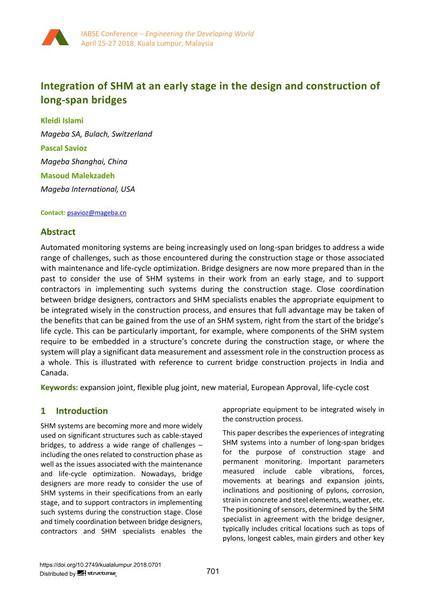Integration of SHM at an early stage in the design and construction of long-span bridges

|
|
|||||||||||
Bibliographic Details
| Author(s): |
Kleidi Islami
(Mageba SA, Bulach, Switzerland)
Pascal Savioz (Mageba Shanghai, China) Masoud Malekzadeh (Mageba International, USA) |
||||
|---|---|---|---|---|---|
| Medium: | conference paper | ||||
| Language(s): | English | ||||
| Conference: | IABSE Conference: Engineering the Developing World, Kuala Lumpur, Malaysia, 25-27 April 2018 | ||||
| Published in: | IABSE Conference Kuala Lumpur 2018 | ||||
|
|||||
| Page(s): | 701-708 | ||||
| Total no. of pages: | 8 | ||||
| DOI: | 10.2749/kualalumpur.2018.0701 | ||||
| Abstract: |
Automated monitoring systems are being increasingly used on long-span bridges to address a wide range of challenges, such as those encountered during the construction stage or those associated with maintenance and life-cycle optimization. Bridge designers are now more prepared than in the past to consider the use of SHM systems in their work from an early stage, and to support contractors in implementing such systems during the construction stage. Close coordination between bridge designers, contractors and SHM specialists enables the appropriate equipment to be integrated wisely in the construction process, and ensures that full advantage may be taken of the benefits that can be gained from the use of an SHM system, right from the start of the bridge’s life cycle. This can be particularly important, for example, where components of the SHM system require to be embedded in a structure’s concrete during the construction stage, or where the system will play a significant data measurement and assessment role in the construction process as a whole. This is illustrated with reference to current bridge construction projects in India and Canada. |
||||
| Keywords: |
life-cycle cost expansion joint flexible plug joint new material European Approval
|
||||
